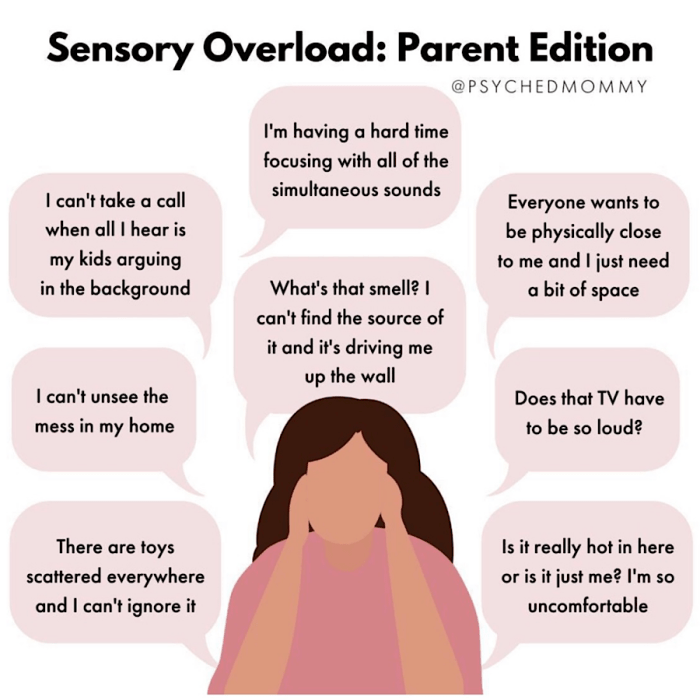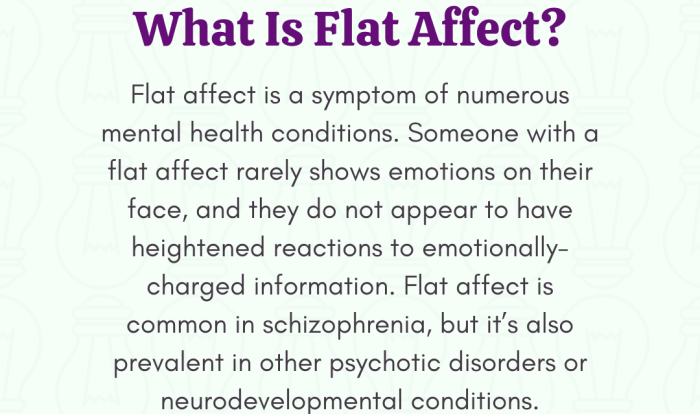Do i have sensory overload quiz – Do you often feel overwhelmed by your surroundings? Do bright lights, loud noises, or crowded spaces make you feel anxious or uncomfortable? If so, you may be experiencing sensory overload. Take our quiz to assess your susceptibility to this condition and learn how to manage its symptoms.
Sensory overload is a condition in which the brain is unable to process all of the sensory information it receives. This can lead to a variety of physical, emotional, and cognitive symptoms, including anxiety, irritability, difficulty concentrating, and fatigue.
Understanding Sensory Overload
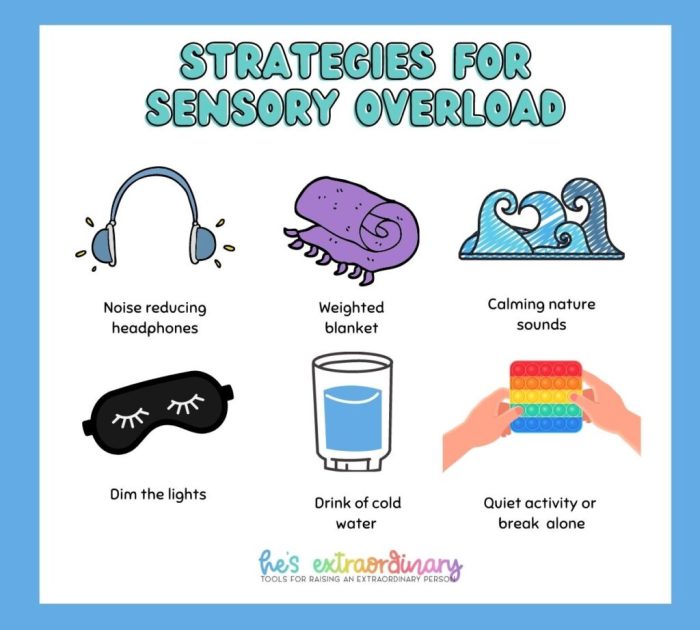
Sensory overload occurs when our senses receive more information than our brains can process. It can be caused by a variety of factors, including bright lights, loud noises, strong smells, and crowded environments.
When we experience sensory overload, we may feel overwhelmed, anxious, or even panicked. We may also have difficulty concentrating, making decisions, and interacting with others.
Common Triggers of Sensory Overload
- Bright lights
- Loud noises
- Strong smells
- Crowded environments
- Fast-paced activities
- Unfamiliar or unpredictable situations
Symptoms of Sensory Overload

Sensory overload occurs when an individual is exposed to excessive or overwhelming sensory input, resulting in a heightened state of arousal and discomfort. The symptoms of sensory overload can manifest in various forms, affecting physical, emotional, and cognitive aspects.
The intensity and duration of these symptoms can vary significantly depending on the individual’s sensitivity and the severity of the sensory overload experienced.
Physical Symptoms
- Increased heart rate and breathing
- Sweating
- Muscle tension
- Headaches
- Fatigue
li>Nausea
Emotional Symptoms
- Anxiety
- Irritability
- Confusion
- Dissociation
- Feeling overwhelmed
- Emotional outbursts
Cognitive Symptoms
- Difficulty concentrating
- Memory problems
- Poor decision-making
- Slowed reaction times
- Difficulty processing information
- Disorientation
Self-Assessment Quiz
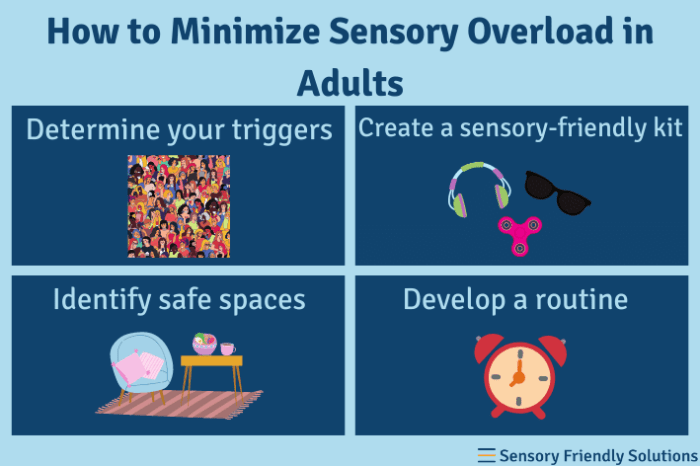
This quiz can help you assess your susceptibility to sensory overload. It covers different sensory modalities, such as visual, auditory, and tactile. By answering the questions honestly, you can gain insights into your own sensory processing.
For each question, indicate how often you experience the described situation on a scale of 1 to 5, where 1 is “never” and 5 is “always.”
Visual Sensitivity
- I am bothered by bright lights.
- I have difficulty reading or working on a computer for extended periods due to eye strain.
- I am sensitive to flickering lights.
- I am easily distracted by visual clutter or movement.
- I prefer dimly lit environments.
Auditory Sensitivity
- I am bothered by loud noises.
- I have difficulty concentrating in noisy environments.
- I am sensitive to sudden or unexpected sounds.
- I am easily distracted by background noise.
- I prefer quiet environments.
Tactile Sensitivity
- I am bothered by certain textures or fabrics.
- I am sensitive to touch or physical contact.
- I have difficulty tolerating tight clothing or jewelry.
- I am easily overwhelmed by crowds or physical proximity.
- I prefer soft and comfortable materials.
Other Sensory Sensitivities
- I am sensitive to strong smells.
- I am sensitive to certain tastes.
- I am easily overwhelmed by multiple sensory stimuli at once.
- I have difficulty filtering out background noise or sensory distractions.
- I experience sensory overload in certain situations, such as crowded places or social gatherings.
Management Strategies

Managing sensory overload can be challenging, but it’s possible with the right strategies. These strategies can help you cope with overwhelming sensory input in the moment and create a more sensory-friendly environment in the long run.
Taking the ‘Do I Have Sensory Overload?’ quiz can help you assess your sensitivity to sensory stimuli. If you find yourself struggling with sensory overload, practicing fill in the blank phrases can be a helpful way to calm your mind and reduce sensory input.
In the moment, try to identify the source of the sensory overload and remove yourself from it if possible. If you can’t remove yourself, try to minimize the sensory input by using earplugs, sunglasses, or a weighted blanket.
Creating a Sensory-Friendly Environment
Creating a sensory-friendly environment can help you reduce sensory overload over time. Here are some tips:
- Choose calming colors and patterns for your home.
- Use soft lighting and avoid harsh noises.
- Keep your home clean and organized.
- Use natural materials and avoid synthetic fabrics.
- Create a designated quiet space where you can relax and recharge.
Coping Mechanisms
In addition to creating a sensory-friendly environment, there are a number of coping mechanisms that can help you manage sensory overload.
- Deep breathing exercises
- Meditation
- Yoga
- Spending time in nature
- Listening to calming music
Resources and Support
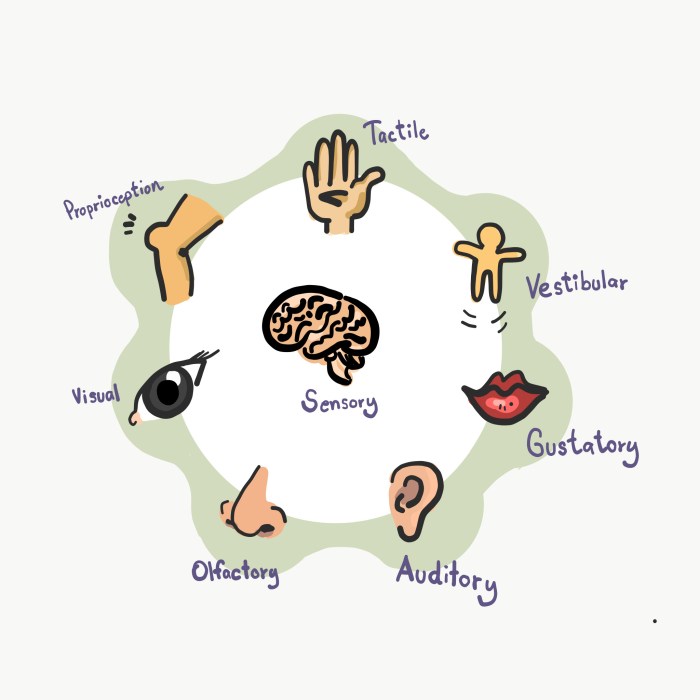
Managing sensory overload can be challenging, but it is important to remember that you are not alone. There are many resources and support systems available to help you cope with and manage sensory overload.
Connecting with professionals and support groups can provide valuable guidance, strategies, and emotional support. These resources can help you understand your sensory needs, develop coping mechanisms, and advocate for yourself in various settings.
Support Groups
Support groups provide a safe and supportive environment where individuals experiencing sensory overload can connect with others who understand their challenges. Sharing experiences, coping strategies, and emotional support can be invaluable in managing sensory overload.
- Sensory Processing Disorder Foundation (SPDF): SPDF offers online and in-person support groups for individuals with sensory processing disorders, including those experiencing sensory overload.
- Autism Society of America (ASA): ASA provides support groups for individuals with autism spectrum disorder (ASD), many of whom experience sensory sensitivities and overload.
- National Alliance on Mental Illness (NAMI): NAMI offers support groups for individuals with mental health conditions, including those that can contribute to sensory overload, such as anxiety and depression.
Professional Help
Connecting with professionals who specialize in sensory processing disorders or mental health conditions can provide expert guidance and support. These professionals can help you assess your sensory needs, develop individualized coping strategies, and advocate for accommodations in various settings.
- Occupational therapists (OTs): OTs are trained to evaluate sensory processing skills and develop therapeutic interventions to improve sensory regulation.
- Psychologists or counselors: Psychologists and counselors can provide therapy and support to help you understand your sensory needs, develop coping mechanisms, and manage stress related to sensory overload.
- Psychiatrists: Psychiatrists can prescribe medications to manage underlying mental health conditions that may contribute to sensory overload.
Online Resources, Do i have sensory overload quiz
In addition to support groups and professional help, there are numerous online resources available to provide information and support for individuals experiencing sensory overload.
- Sensory Processing Disorder Foundation (SPDF): SPDF provides a wealth of information on sensory processing disorders, including articles, videos, and resources for finding support.
- Star Institute for Sensory Processing Disorder: The Star Institute offers online courses, workshops, and resources for professionals and individuals with sensory processing disorders.
- National Institute of Mental Health (NIMH): NIMH provides information on mental health conditions that can contribute to sensory overload, as well as resources for finding help.
FAQ Guide: Do I Have Sensory Overload Quiz
What is sensory overload?
Sensory overload is a condition in which the brain is unable to process all of the sensory information it receives. This can lead to a variety of physical, emotional, and cognitive symptoms, including anxiety, irritability, difficulty concentrating, and fatigue.
What are the symptoms of sensory overload?
The symptoms of sensory overload can vary depending on the individual, but may include anxiety, irritability, difficulty concentrating, fatigue, headaches, nausea, and difficulty sleeping.
How is sensory overload diagnosed?
Sensory overload is diagnosed based on a clinical evaluation by a healthcare professional. There is no specific test for sensory overload, but a healthcare professional can assess your symptoms and rule out other potential causes.
How is sensory overload treated?
There is no cure for sensory overload, but there are a variety of treatments that can help to manage the symptoms. These treatments may include therapy, medication, and lifestyle changes.
